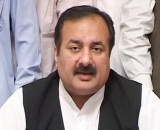Mismanagement of economy criticised
Conference discusses policy impact of research for growth in developing states

The Centre for Research in Economics and Business (CREB) and the Innovation and Technology Centre (ITC) at the Lahore School of Economics opened their 7th International Conference on Applied Development Economics, in collaboration with the International Growth Centre and the Consortium for Development Policy Research.
The conference spans three days, from August 18 to 20, 2025 and includes presentations from international and local researchers working on development issues in low- and middle-income countries.
It broadly focuses on thematic areas such as health, gender, intergenerational mobility, work and information frictions, adaptive strategies for climate resilience, digital interventions and labour market adjustments, trade frictions and industrial policy, poverty alleviation, and human capital and education frontiers.
The aim of the conference is to highlight recent research that can have a lasting policy impact for sustainable growth in the developing world, provide early-career researchers the opportunity to obtain feedback on their ongoing work, and foster a mutually beneficial exchange of ideas and discussions among researchers on potential collaborations.
Lahore School of Economics Rector Dr Shahid Chaudhry, in his inaugural remarks, pointed to the presence of economists from nine countries. While sharing his perspective of the present economic situation of Pakistan, he mentioned macroeconomic mismanagement as the main cause of poor economic performance.
At the first session on Health, Gender & Intergenerational Mobility, LUMS Assistant Professor of Economics Syeda Warda Riaz discussed the effects of a modest financial incentive (transport subsidy) programme targeted at improving maternal healthcare on child health outcomes. She found that the programme is successful in creating a positive impact on height-for-age z-scores and in lowering moderate stunting by eight percentage points.
In the second and final session for the day on Gender, Work and Information Frictions, Lahore School of Economics Associate Professor Dr Hamna Ahmed examined in her paper how intra-household information asymmetries influence preferences for outside-home employment for women. She found that misaligned spousal beliefs are a key non-economic constraint to female labour force participation.



















COMMENTS
Comments are moderated and generally will be posted if they are on-topic and not abusive.
For more information, please see our Comments FAQ